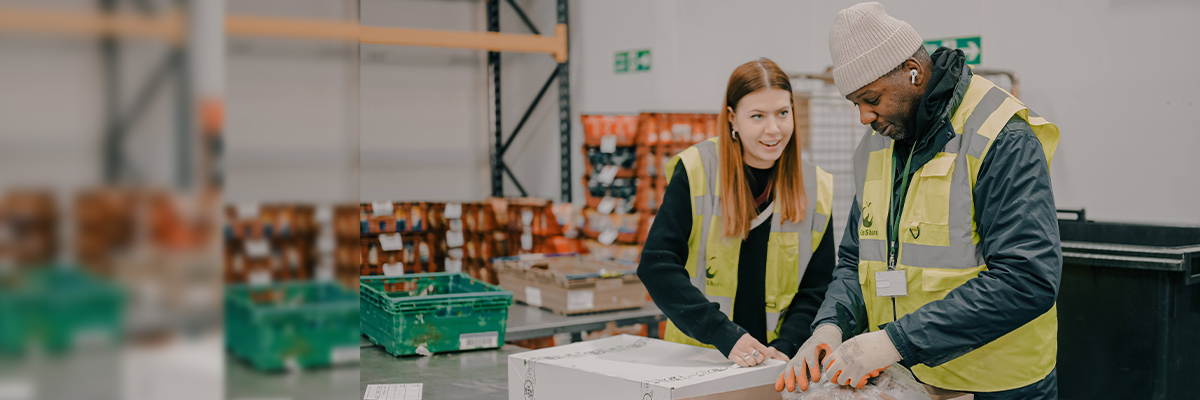
FareShare is the UK’s national charitable food redistribution network. They help to supply almost 9,500 frontline charities and community groups with quality surplus from across the food industry. Each week, they provide enough to create almost a million meals for vulnerable people.
In 2021, they started working with Lancaster University – through LUMS and the STOR-i Centre for Doctoral Training – to look at how they could solve some of the challenges they face due to increased sector demand.
The collaboration led to innovations and solutions that would not have been possible otherwise.
Carl Hawkes, Head of Network Support at FareShare, explains how his organisation came to work with Lancaster University.
"The connection with Lancaster was serendipitous. A member of our team had worked previously with Stephen King (a Partnership Development Manager in LUMS) and thought Lancaster might be able to help us.
"We've gone through a huge amount of growth in the past five years, from distributing around 16,000 tons of food a year to now more than 50,000 tons. Supply doesn't meet demand. As a result, we have to make difficult decisions about where we allocate food and how, looking to maximise our impact and squeeze as much social value out of that food as possible.
"There were several things we needed to look at. How can we make our transport routes more efficient, reducing our expenditure and making our money go further? How do we allocate food more fairly across the country?
"We wanted to bring together a bunch of smart people to help us solve these challenging questions. Lancaster provided that; we spoke to Stephen, and it took off from there."
Meetings with LUMS academic Dr Anna-Lena Sachs, an expert on inventory management and waste, led to the realisation the issues involved included questions around measuring social value, forecasting and optimisation, and logistics.
This led to the involvement of STOR-i. Centre Co-Director Professor Idris Eckley, who worked with Dr Sachs to bring in a team of PhD students for a problem-solving day, and a subsequent week-long data dive – the latter also involving students from a Science Foundation of Ireland doctoral centre.
Carl explains how things worked.
"On the problem-solving day, the students came in, we outlined our challenges, and set some generic questions, to see if they could see solutions. It was really positive, but we felt we could do more.
"This took us to the data dive, where we had members of our team and the PhD students all together for the week, analysing millions of pieces of data, and getting into the details. We would see if there was anything within our data that would enable us to answer a problem or tell us something we didn't know. The data dive stretched our thinking and set us on a path to start to use data in different ways operationally.
"For example, we found that food supply volumes typically increase in the days leading up to and the days after a natural disaster, or an extreme weather event. Any time there is a storm, our food volumes spiked. That was an interesting insight, and we prepare for it now."
Working with Lancaster has changed FareShare for the long term. There are new structures in place building on findings from the problem-solving day and the data dive, as Carl describes.
"On the back of the collaboration, I put in a business case to fund an analyst in my department. Her job is to essentially help us answer in full some of the questions posed to the Lancaster PhD students. All her work is based on their outputs.
"She is working on the FARE Project – the Fair Allocation and Redistribution of food. The idea of this is to use publicly available data sets to help us create an automated system of allocating food. We are building an algorithm with data on regional population, deprivation, social value and regional centre capacity/demand to help us automate where we should send our food.
"That's transformational. We make really hard choices, and these choices should be based on data, on where that food is most needed and where it can have the greatest impact. The seed of that project was with Lancaster University and the PhD students. It is having a real impact right across the country in terms of what we do."
Carl’s experiences of working with Lancaster have been overwhelmingly positive, and he is thankful for the chance to have done so.
"Working with Anna and the team throughout the process, there was a real curiosity about FareShare and our problems. They kept asking questions like why, and how, and what can we do to help? Those questions and the framing of them were really helpful, because they started to unearth lots of interesting challenges that we are facing at FareShare. My experience in that sense was just hugely positive.
"The students were brilliant, inquisitive, curious, intelligent, really engaged, super excited about the problem. As an organisation, it has been just amazing working with Lancaster – they've set us on a really positive journey."

